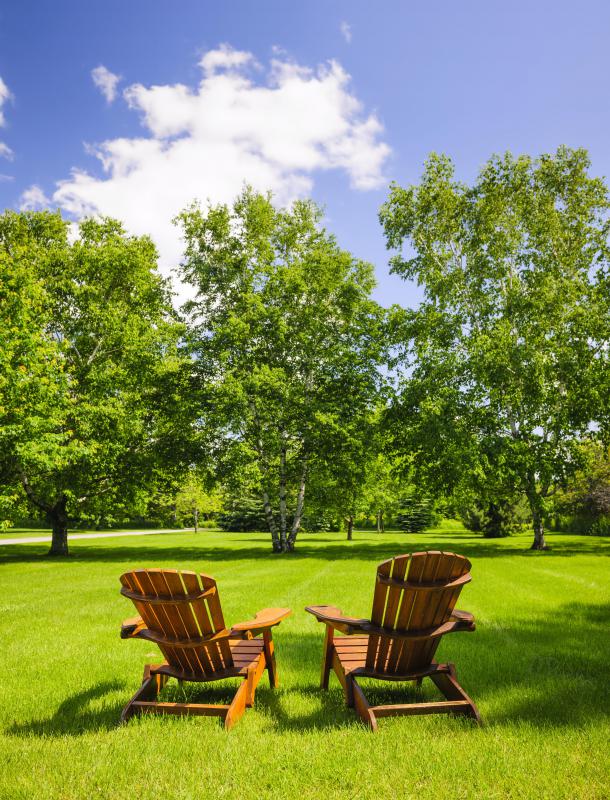At WiseGEEK, we're committed to delivering accurate, trustworthy information. Our expert-authored content is rigorously fact-checked and sourced from credible authorities. Discover how we uphold the highest standards in providing you with reliable knowledge.
How Often Should I Water a Lawn?
Proper watering is necessary to keep your grass green and your lawn looking nice. Overwatering your grass is just as detrimental as not watering enough, as your lawn can develop fungus. How often you water a lawn depends upon how much water it takes to soak the root zone, the type of grass you have and the weather.
Before determining how often to water a lawn, it is important to learn how long it takes for the water to soak the soil in the root zone of your grass. The root zone for bluegrass is 6 to 8 inches (15.24 to 20.32 cm) underneath the top soil. All other grasses have a root zone 8 to 12 inches (20.32 to 30.48 cm) beneath the soil. The length of time it takes for the water to reach the root zone is also determined by the soil type. It takes longer for water to penetrate through clay-type soils than it does sandy soils.

Turn on your sprinklers and water for 15 minutes. Turn them off and wait 24 hours before digging a small hole in the ground to learn how deep the water has soaked into the soil. Divide 120 by the depth of the soil that has become moist, in inches. For example, if the water soaked in 4 inches (10.16 cm), figure 120/4 = 30 minutes. You would have to water a lawn for an hour for it to soak in 8 inches (20.32 cm).

Next, you need to figure out how many inches of water your sprinklers produce within that time period. To do this, set straight-sided cans around the lawn and water your grass for the amount of time you determined it takes to soak your root system. After watering, measure the depth of the water in the cans, using inches.
After determining the length of time it takes to soak the root zone and the amount of water your sprinklers produce in that time period, you must water the same amount of time, no matter what time of the year it is. The change in seasons, though, will determine how many times per week you should water. The hotter it is, the more often you will need to water.

Bluegrass requires more water than most other grass types. It needs 0.25 to 0.3 inch (0.635 to 0.85 cm) of water per day during the hot summer months. If your sprinklers produced 1 inch (2.54 cm) of water during the watering period, that means you will need to water every three days during the summer.
Bermuda grass needs 0.2 to 0.16 inch (0.51 to 0.42 cm) of water, per day, during the summer season. Again, if your sprinkler produces 1 inch (2.54 cm) of water per session, you will need to water a lawn every five to six days. If you have to water a lawn more often then often three times per week, you may want to modify your soil or change the type of grass you have.

Cooler weather or excessive amounts of rain will require less watering periods, but the same length of time. If your grass turns dull green, or blue, you may need to water a lawn more often. This can also be determined if the blades of grass fold over, or footprints are visible after walking on the grass. In order to conserve water, only water a lawn when necessary.
AS FEATURED ON:
AS FEATURED ON:














Discussion Comments
@ ValleyFiah- There is an option that should meet all of your requirements. Drip irrigation systems are available for lawns and they would be perfect for your situation. Drip irrigation systems use perforated pipes and pipes with spray nozzles to water your lawn through the roots. The system can be connected to your grey water and water catchment systems.
In the past drip irrigation systems were not that well suited for lawns because they would get clogged with grass roots and have to be dug up. The systems available today have solved this by incorporating a mild herbicide in the plastic; preventing grass from growing their roots around the system.
Drip systems are also cost effective. They cost about 1 1/2 times as much as a sprinkler system if you are starting from bare ground, but you will make the money back on savings. Your savings will come from lower maintenance costs (no more sprinkler heads run over by the lawn mower), and water savings. If I am correct the cost of water is usually higher in desert climates, and drip systems have virtually no evaporation. Hope this helps!
What about lawns that are oddly shaped and located on hills? Are there any techniques for watering these types of lawns that don't have large amounts of over spray?
I just bought a house in foreclosure and it needs a lot of landscaping work. I thought it might just be a good idea to excavate the entire lawn and start over. I am remodeling the house to be an eco-friendly home; grey water, water catchment, bamboo floors, skylights and new windows, etc. How can I have a lawn that fits with this theme?
I live in a desert climate so I do not want an irrigation system that causes a lot of run-off, loses a lot of water to evaporation, or sprays the neighbor’s lawn or the sidewalk. Is there anything out there that can do this or do I need to consider mostly desert landscaping?
Post your comments